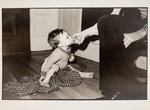The Boston Globe has an interesting article on the emergent techniques for measuring babies' brain development and activity, and how these advances are changing the commonly accepted model for how babies' brains work and develop.
On one level, it's trippy stuff, all this idea of baby consciousness and hyperawareness to the world around them, an all-out sensory spongesoaking that we apparently learn to suppress as we get older, if only so that we can get anything done.
On another level, it explains why kids won't listen to you, or why they won't hurry when you want them to; they are literally incapable of focusing on something as narrow as your time schedule:
The hyperabundance of thoughts in the baby brain also reflects profound differences in the ways adults and babies pay attention to the world. If attention works like a narrow spotlight in adults - a focused beam illuminating particular parts of reality - then in young kids it works more like a lantern, casting a diffuse radiance on their surroundings.It's also why researchers say little kids shouldn't watch screen media; they literally cannot tear their hyperactive little brains away from the sensory flood. Not coincidentally, a Hebrew University study mentioned in the Globe found that adults engrossed in a movie have similar prefrontal cortex activity as babies."We sometimes say that adults are better at paying attention than children," writes [UC Berkeley psychologist and author of the forthcoming book, The Philosophical Baby, Alison] Gopnik. "But really we mean just the opposite. Adults are better at not paying attention. They're better at screening out everything else and restricting their consciousness to a single focus."
This, plus the namecheck of Baudelaire ["Genius is nothing more nor less than childhood recovered at will."] reminded me of another way adults try to tap into this higher, infantile state of consciousness. A couple of years ago, the Oxonian Review of Books brilliantly paired two newly translated autobiographical works by Walter Benjamin: Berlin Childhood Around 1900 and On Hashish. Apparently, Benjamin was a) Baudelaire-obsessed, b) very self-aware about the implications of romanticizing or over-remembering a childlike existence, and c) a massive pothead.
Inside the baby mind | It's unfocused, random, and extremely good at what it does. How we can learn from a baby's brain. [boston via kottke]
Unraveling Walter Benjamin, Winter 2006 [ oxonianreview.org]
Gopnik has co-authored several other books on cognitive development, including The Scientist In The Crib and How Babies Think [amazon]

